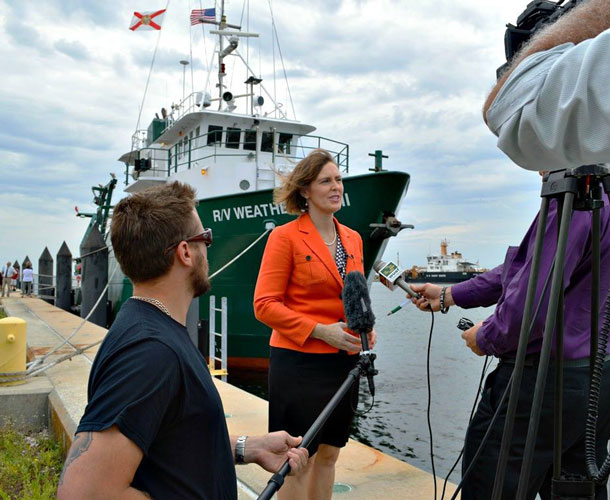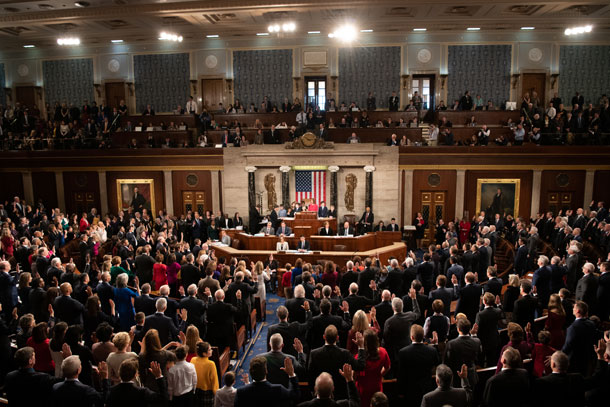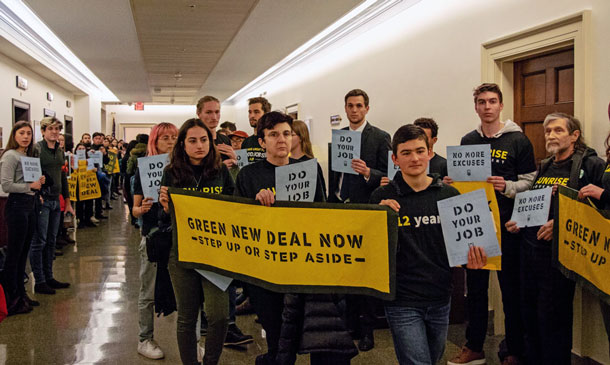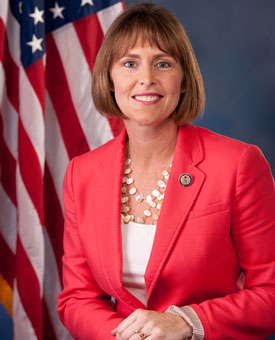Capitol Hill Panel on Climate Crisis
Air Date: Week of January 11, 2019

Rep. Castor (D-FL) spoke to reporters at a Deepwater Horizon disaster anniversary event in 2015. (Photo: courtesy of Rep. Kathy Castor)
The House Select Committee on the Climate Crisis created January 2018 by House Speaker Nancy Pelosi will press for climate change to be taken into account for all House legislation, says its Chair Kathy Castor (D-FL). Congresswoman Castor tells Host Steve Curwood about priorities for the committee and how it will work with standing House committees including Science, Energy/Commerce and Transportation/ Infrastructure.
Transcript
CURWOOD: From PRI and the Jennifer and Ted Stanley Studios at the University of Massachusetts Boston, this is Living on Earth. I’m Steve Curwood.
The Democratic majority in the House of the US Congress now has what it calls the Select Committee on the Climate Crisis. This committee has limited powers, but will work with more general standing committees that can compel witnesses and vote on bills. Among its duties, the climate crisis committee is the forum for distilling the calls for a green new deal into an actual set of program proposals. House Speaker Nancy Pelosi appointed Kathy Castor, a seventh-term Congresswoman from Florida to chair the Select Climate Crisis Committee. Congresswoman Castor has pledged not to take donations from the fossil fuel industry and has sold a mutual fund holding in the utility sector critics had questioned. Kathy Castor joins me now from her Tampa office. Welcome to Living on Earth!
CASTOR: Thank you, Steve.
CURWOOD: So tell me, Congresswoman Castor. How did you feel when Speaker Pelosi asked you to chair the House Select Committee on the climate crisis?
CASTOR: I'm very humbled with Speaker Pelosi's confidence in me to lead this re-instituted Select Committee on the Climate Crisis. We have a major challenge ahead. I was in the Congress when we tackled climate change before through the Recovery Act, and then through ACES. That was the American Clean Energy and Security Act. But now the threat of climate change, the cost of the warming planet really present us with a major challenge ahead.
CURWOOD: Tell me about the climate change threats and impacts in your own district, the Florida's 14th which includes the Tampa Bay area. What's that experiencing?
CASTOR: The Tampa Bay area and is known for now as being one of the most vulnerable to rising tides and storm surge if we were to be pounded by a major hurricane. There is nothing like having to evacuate out of your home like I had to do when Hurricane Irma was bearing down last year, taking all of the family pictures and photo albums, putting them in the back of the car and driving them to the top of a parking garage nearby.
What I've seen during my lifetime is a changing threat. It's more dire now. The waters are warmer. The storm surge threat is more serious. These extreme weather events are upon us. It's not something in the distant future. It is the here and now. Also, what I've seen is huge new costs being foisted on to everyday Americans, and from a Florida standpoint, that's meant paying more for your air conditioning bills, property insurance, flood insurance rates going up, and the cost of having now your property taxes to go to fixing infrastructure, and updating infrastructure, because the threats are different, beach re-nourishment. And in Congress, we're now laying out billions of dollars every term to respond to extreme weather events as well.

434 lawmakers, including 89 new members, were sworn in to the 116th Congress on January 3rd, 2019. (Photo: Phi Nguyen, House of Representatives)
CURWOOD: So, with the House Select Committee on the Climate Crisis that you're now chairing, what are some of your first priorities for this committee?
CASTOR: The committee will press for urgent action to dramatically reduce carbon pollution in defense of America. And we're going to accomplish as much as we can legislatively to establish new national policies. But we know that that's a daunting task. With President Trump still in the White House, and the GOP still in control of the United States Senate, I anticipate there will be some roadblocks to action. So, we will do as much as we possibly can to press and prod to reduce carbon pollution from all sectors. But then I think we're going to shine the light on communities across the country that are well ahead of the US Congress and the Trump administration that are dramatically reducing carbon pollution to try to hold them up as examples to national government and to other communities across the country.
CURWOOD: Sounds like you might be traveling around the country then and having hearings in these communities.
CASTOR: We absolutely will. There are very conservative communities that are going carbon free. They need to be held up as a good example. There are some communities that are stuck in the mud. There are some states like the state of Florida, frankly, that are way behind when it comes to energy efficiency policies, renewable energy policies and carbon reduction. We want to shine the light on them as well.
CURWOOD: You've been quoted as saying that your committee needs to be bipartisan. So, what kinds of the aspects of climate disruption do you think can help bridge the gap across the island within the House?
CASTOR: I think we can build coalitions on fuel economy standards. This, if you recall, just recently, the Trump administration said America we're going to go backwards. Consumers, we're going to go backwards when it comes to fuel economy. Most of the automakers, and most of my GOP colleagues were not pushing for that for rollbacks. Everyone kind of understands that decade after decade, we've made substantial progress reducing costs for consumers and making our cars more efficient and reducing carbon through American ingenuity and innovation. And I would hope that fuel economy is one area where we can find some bipartisan support. Our national laboratories are the best in the world. And they have a lot of bipartisan support. The technologies on carbon reduction and energy efficiency being produced by our national laboratories now has to be taken to market through partnerships with businesses. We have the cutting edge technology, and I think that a lot of my GOP colleagues will be very interested in greater investments in what's coming out of our national laboratories on carbon reduction.

More than 1,000 youth activists calling for a Select Committee on a Green New Deal staged a sit-in outside Congressional offices on December 10th, 2018. Speaker Pelosi declined to create a separate committee to legislate a Green New Deal but did form the House Select Committee on the Climate Crisis to hold hearings and curate proposals. (Photo: Becker1999, Flickr CC BY 2.0)
CURWOOD: You mentioned the push by the Trump administration against the fuel economy standards for vehicles. That would seem to be in the interest of oil companies, both at home and also folks like the Russians in the Saudis, who export a lot of oil for mobile transport.
CASTOR: Yeah, it's really anti-American rolling back our fuel economy standards, because you're just reaching into the pocketbooks of every American family and passing those dollars on to dirty oil interests and fossil fuel companies. We now know based on some reporting, that it was the fossil fuel companies, big oil companies that weighed in with the Trump administration, and unfortunately, their profits won the day over the people's interest. So, we've got to bring public opinion to bear now to shift back on that decision.
CURWOOD: I imagine the oil companies are worried they're not gonna be able to sell their product in a few years?
CASTOR: Well, they're going to have to go through a dramatic transition, and you're seeing it already in the state of Texas where oil has always been king. Now, wind power a renewable, clean wind power is growing by leaps and bounds in the state of Texas. Solar power across the United States growing by leaps and bounds, and there's going to be a significant transition among electric utilities and energy companies, but they need to push. They need to push. If we do not have national policies that press them to do this, boy, it's going to end up costing America and American families a whole lot more down the road.
CURWOOD: Now at this point, what do you know about which of your fellow members of Congress might join you on the Climate Crisis Committee and who might become the ranking member?
CASTOR: This is yet to be determined. I anticipate over the next week, maybe before the Dr. Martin Luther King Jr. Holiday we’ll know who is going to be serving on the committee. I hope that a number of the energetic passionate smart freshman members will come on to the committee to help lead the charge.
CURWOOD: Now, some of the freshmen, though, have expressed some skepticism about the committee, for example, Sean Casten, who just was elected from Illinois from the first time he's a person has been in the energy efficiency business. And he says, well, he'd be more interested in serving on the standing Energy and Commerce Committee than on the Select Committee on the Climate Crisis. How do you respond to somebody like that?
CASTOR: Well, we need representative Casten, and we need everyone to be weighing in. I have to say, I kind of agree with them. I've served in the Congress now for a number of terms, I'm skeptical too about the ability of Congress, with the GOP still in control the U.S Senate and the Trump administration to move the needle dramatically. But we do not have time to waste. We don't have time to spin our wheels, we have got to press and it's got to come from the select committee, that will be something of a focal point for pressing all of the standing committees for action, and then it will be up to the Energy and Commerce Committee, the Transportation Infrastructure [Committee], every single committee will have to have a climate piece on their agenda. And I anticipate the members of the select committee will press for every piece of legislation that comes to the floor of the house to be looked at through a green lens, does it help us reduce carbon pollution and put us in a better place and reducing greenhouse gas emissions? Or does it not? Every bill, every appropriation that comes before us.
CURWOOD: Now, Frank Pallone, who has been Ranking Member of the Energy and Commerce Committee is now the chair. He says he wants to have a hearing on climate right away at his committee. What is this portend in terms of potential turf battle versus maybe strategy of synergy?
CASTOR: No, it's a strategy of synergy. The last term I served as the Vice ranking Member of the Energy and Commerce Committee. So there is a great partnership there with Chairman Palone and the members of the Energy and Commerce Committee for action. I imagine we will have some joint hearings. If we ever need to issue a subpoena Chairman Palone has said we will work together to do that. And at the Energy and Commerce Committee over the past few terms, while the Republicans have been in charge, we asked for...we begged them for hearings on climate and the escalating costs of climate change, and they refused time and time again. So, there is a lot of pent up desire among the Democratic caucus and people across this country to begin to take action. And that's a great sign that Chairman Pallone said that's what he will do in his first hearing.

Rep. Kathy Castor (D-FL) is a seventh-term Congresswoman and Chair of the House Select Committee on the Climate Crisis. (Photo: United States Government, Wikimedia Commons, Public Domain)
CURWOOD: How optimistic are you that you can make progress given that, in fact, the Senate and the White House are still controlled by Republicans who have been very vocal in their skepticism of the dangers of climate disruption?
CASTOR: During my lifetime, I've seen America make dramatic improvements when it comes to clean air, clean water and acid rain. Now, with the climate crisis, that's just the most daunting challenge we've ever had. I'm optimistic that America can tackle this and preserve our way of life. I think we have a moral obligation to our kids and future generations to do it.
CURWOOD: Congresswoman Kathy Castor is serving her seventh term representing Florida's 14th district and she's chair now of the House Select Committee on the Climate Crisis. Congresswoman, thanks so much for taking the time with us today.
CASTOR: Thank you.
Links
USA TODAY | "Climate change: Meet the Florida congresswoman leading the House charge"
Living on Earth wants to hear from you!
Living on Earth
62 Calef Highway, Suite 212
Lee, NH 03861
Telephone: 617-287-4121
E-mail: comments@loe.org
Newsletter [Click here]
Donate to Living on Earth!
Living on Earth is an independent media program and relies entirely on contributions from listeners and institutions supporting public service. Please donate now to preserve an independent environmental voice.
NewsletterLiving on Earth offers a weekly delivery of the show's rundown to your mailbox. Sign up for our newsletter today!
 Sailors For The Sea: Be the change you want to sea.
Sailors For The Sea: Be the change you want to sea.
 The Grantham Foundation for the Protection of the Environment: Committed to protecting and improving the health of the global environment.
The Grantham Foundation for the Protection of the Environment: Committed to protecting and improving the health of the global environment.
 Contribute to Living on Earth and receive, as our gift to you, an archival print of one of Mark Seth Lender's extraordinary wildlife photographs. Follow the link to see Mark's current collection of photographs.
Contribute to Living on Earth and receive, as our gift to you, an archival print of one of Mark Seth Lender's extraordinary wildlife photographs. Follow the link to see Mark's current collection of photographs.
 Buy a signed copy of Mark Seth Lender's book Smeagull the Seagull & support Living on Earth
Buy a signed copy of Mark Seth Lender's book Smeagull the Seagull & support Living on Earth

